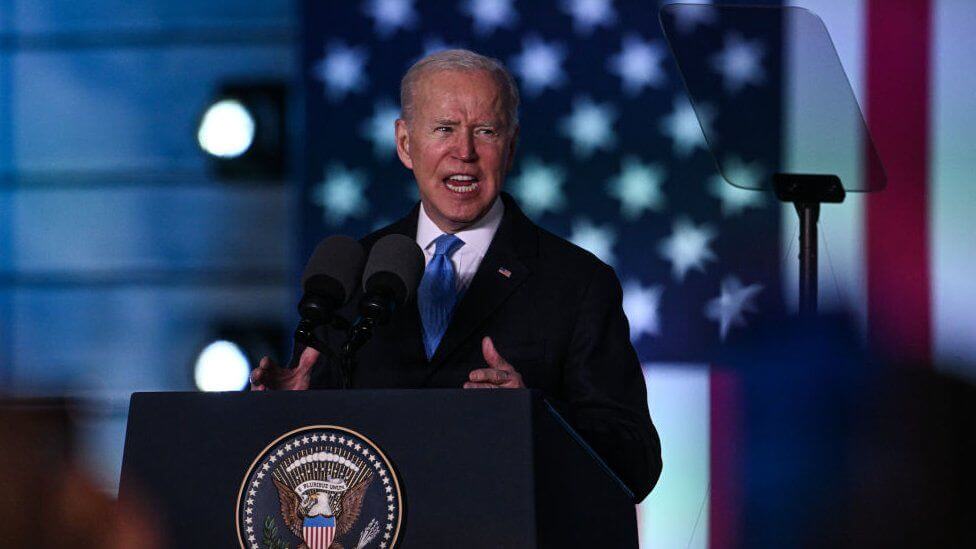On Sunday, White House officials appeared to recant President Joe Biden’s statements during a speech in Warsaw the day before, wherein he declared that Putin “cannot remain in power,” possibly alluding to an attempt at regime change.
United States (US) Secretary of State Antony Blinken told reporters that Biden’s comment in Poland merely alluded to the fact that the Russian leader “cannot be empowered to wage [a] war or engage in aggression against Ukraine or anyone else.” He stressed, “We [US] do not have a strategy of regime change in Russia or anywhere else,” adding that such a decision lies in the hands of the Russian people.
"For god's sake this man can not remain in power!"
— Max Blumenthal (@MaxBlumenthal) March 26, 2022
After denying NATO enlargement has anything to do with destabilizing Russia, Biden closes his Poland address with a stentorian demand for regime change in Moscow.
Washington's ultimate goal, made plain. pic.twitter.com/vjg6Vxs7dw
Biden’s comments about Putin came during his speech in Poland, which was the final destination on his European trip. During the tour, he held back-to-back meetings with the G7, the North Atlantic Treaty Organization (NATO), and the European Union (EU) to address the ongoing Ukraine crisis.
The US President started his speech in Warsaw by recalling Poland’s history of resisting Soviet suppression. To this end, he commended the country for charting out its own path towards democracy and freedom. Biden evoked the memory of Poland’s first democratic president, Lech Wałęsa, saying, Warsaw “has stood where liberty has been challenged and liberty has prevailed.”
I visited Ukrainian refugees who have fled to Poland this afternoon. You don’t need to speak the same language to feel the roller-coaster of emotions in their eyes. I want to thank my friend Chef José Andrés, his team, and the people of Warsaw for opening your hearts to help. pic.twitter.com/VU3Oe0EXAL
— President Biden (@POTUS) March 26, 2022
In this context, Biden criticised Putin for his invasion of Ukraine by saying, “Russia has strangled democracy.” He stressed that Putin’s claims about ‘de-Nazifying’ Ukraine are “lies,” accusing the Russian leader of using brute force to “satisfy a craving for absolute power and control.” The US President also dismissed the Kremlin’s concerns regarding the eastward expansion of NATO, saying that the Western military alliance is a strictly defensive mechanism that has “never sought the demise of Russia.”
Biden highlighted that the Western sanctions targeting Russia’s economy constitute a “new kind of economic statecraft,” for which only Putin is to blame. On top of the economic sanctions levelled against the Russian government and its private sector, Biden reiterated Washington’s commitment to providing military and humanitarian support to Ukraine.
The US leader noted that Washington has already contributed $1.35 billion since Putin’s invasion, adding that the war in Ukraine has strengthened NATO’s unity. However, Biden made it clear that the American troops in Europe will not engage in conflict with Russia and will only protect NATO’s borders.
Today, I met with Polish President Andrzej Duda in Warsaw. I thanked him and the people of Poland for opening their homes and hearts to their neighbors in need. And we discussed our shared commitment to support the people and government of Ukraine. pic.twitter.com/bxKnkAGi6J
— President Biden (@POTUS) March 26, 2022
The US President commended the generosity shown by the Polish people towards Ukrainian refugees as he announced that the US will admit 100,000 Ukrainian refugees, and urged other countries to share the refugee burden with Poland.
Biden concluded his speech by emphasising on Europe’s need to end its energy dependence on Russia, noting that this was also addressed in his earlier meeting with the European Commission.
Separately, in a meeting with Polish President Andrzej Duda, Biden affirmed Washington’s support for Warsaw in terms of humanitarian assistance and energy needs. He underscored the US’ “unwavering commitment” to the NATO Article 5, which deems an attack on one NATO member as an attack on all members.

